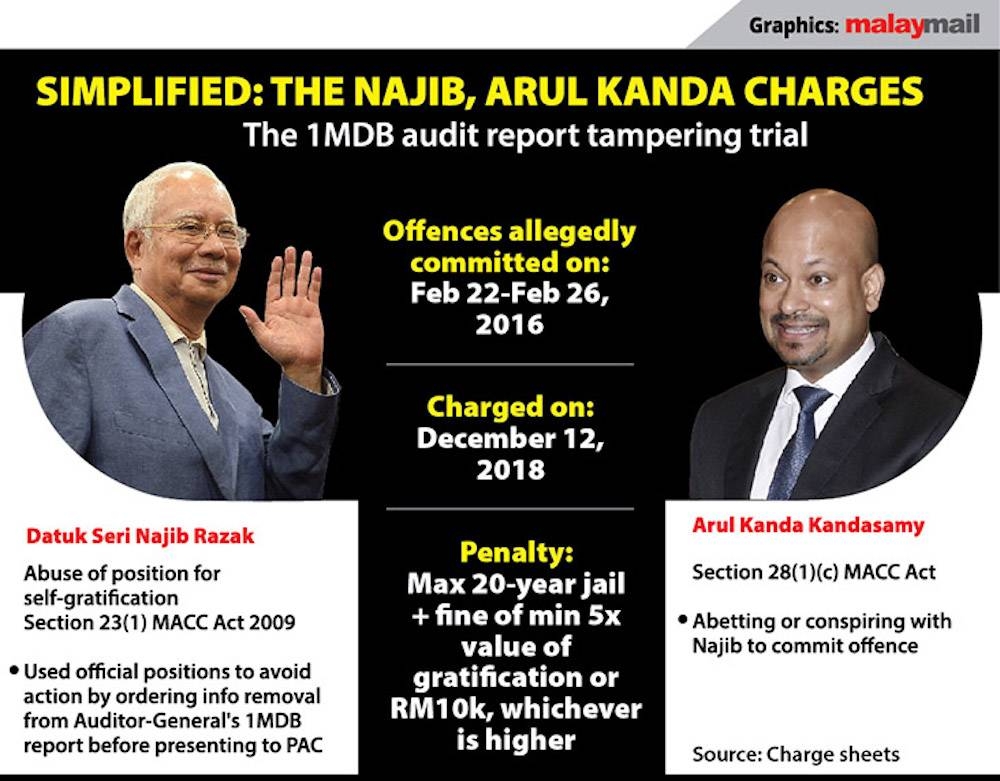KUALA LUMPUR, June 14 — Former 1Malaysia Development Berhad (1MDB) CEO Arul Kanda Kandasamy is still an accused person in the same trial as former prime minister Datuk Seri Najib Razak, Arul Kanda’s lawyer clarified today.
Arul Kanda’s lawyer Datuk N. Sivananthan said that several news reports’ headlines appeared to have taken his comments in the High Court today out of context and that these headlines had sought to imply that his client was allegedly “‘happily’ turning prosecution witness” against Najib.
Sivananthan clarified that if Arul Kanda is called in as a prosecution witness by the High Court, his client would still be an accused person while testifying in the trial as required under the Malaysian Anti-Corruption Commission (MACC) Act.
“In this regard, I wish to clarify, that firstly, my client remains a co-accused, even though he may be called as a prosecution witness, as he is being compelled to give evidence under the provisions of Section 63 of the MACC Act.
“Secondly, it is my client’s position that when investigations were first commenced by the MACC in this matter, he voluntarily cooperated and provided the investigators with all information within his knowledge,” he said in a statement today.
Sivananthan further explained what he had told the High Court this morning, namely that Arul Kanda would be ready to stand by his previous statement to the MACC during investigations if he is called in as a prosecution witness in this trial.
“His position then and his position now is that he should never have been charged and, in that context, should the learned Judge decide that he is to become a prosecution witness under Section 63 of the MACC Act (ie whilst still being a co-accused), then, in that situation, he is prepared to give evidence consistent with the statements he has previously given to the MACC,” he said.
On May 20, the prosecution filed its written application under Section 63 of the MACC Act 2009 to call Arul Kanda in as a prosecution witness.
Under Section 63(1), in a situation where two or more people are charged with an offence under the MACC Act, the court may require one or more of them to give evidence as witnesses for the prosecution if a written application is made by the public prosecutor.
Section 63(3) provides that every person accused under the MACC Act and required to give evidence as prosecution witness “shall be entitled to receive a certificate of indemnity”, if the court finds that he has made a “true and full discovery” of all things to which he was examined on, with this certificate to be a bar to all legal proceedings against him over such matters.
In other words, if the High Court allows the prosecution’s Section 63 application to call Arul Kanda in as a prosecution witness, and if the High Court decides to give him a certificate of indemnity after he has testified, he could stand a chance of being acquitted and discharged as an accused person in this trial.
As of now, Arul Kanda however remains an accused person in this trial.
High Court judge Mohamed Zaini Mazlan will decide on June 24 whether to allow the prosecution’s application to call in Arul Kanda as a prosecution witness in this trial.
In this trial, Najib is accused of having as then prime minister and then finance minister abused his position between February 22, 2016 and February 26, 2016 to receive self-gratification in the form of protection from civil or criminal action over his role in the handling of 1MDB operations, by instructing for amendments to the auditor-general’s report on 1MDB — which was already finalised and ready to be presented to the parliamentary watchdog Public Accounts Committee (PAC) — before it was finally presented to the PAC.
Arul Kanda was charged with abetting Najib.























